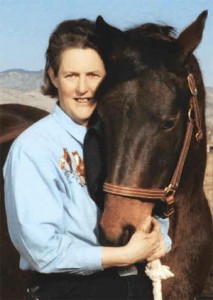
Temple Grandin, Ph.D. presently works as a Professor of Animal Science at Colorado State University. She’s been a pioneer in developing low stress handling techniques for cattle and horses and is a fascinating woman.
Born in Boston in 1947, Dr. Grandin didn’t talk until she was three and a half years old, communicating her frustration instead by “screaming, peeping and humming”. In 1950, she was labeled “autistic,” and her parents were told she should be institutionalized. She eventually found a mentor, who recognized her interests and abilities, and she was able to attend college. Dr. Grandin is a high functioning autistic and writes and lectures about autism giving insights from her experience growing up. At some point she realized that as an autistic she had unique knowledge about how animals relate to the world and began writing about that. She’s appeared on numerous TV and radio programs and is one of the most sought after speakers for western shows.
She later expanded into becoming a successful livestock handling equipment designer, one of very few in the world. She has designed the facilities in which half the cattle are handled in the United States, consulting for firms such as Burger King, McDonald’s, Swift and others.
 From Wikipedia:
From Wikipedia:
” I think using animals for food is an ethical thing to do, but we’ve got to do it right. We’ve got to give those animals a decent life and we’ve got to give them a painless death. We owe the animal respect.
“Grandin’s interest in animal welfare began with designs for sweeping curved corrals, intended to reduce stress in animals being led to slaughter.
“Grandin is considered a philosophical leader of both the animal welfare and autism advocacy movements. Both movements commonly cite her work regarding animal welfare, neurology, and philosophy. She knows all too well the anxiety of feeling threatened by everything in her surroundings, and of being dismissed and feared, which motivates her in her quest to promote humane livestock handling processes. Her business website has entire sections on how to improve standards in slaughter plants and livestock farms. In 2004 she won a “Proggy” award, in the “visionary” category, from People for the Ethical Treatment of Animals.
“One of her most important essays about animal welfare is “Animals are not Things,” in which she posits that animals are technically property in our society, but the law ultimately gives them ethical protections or rights. She uses a screwdriver metaphor: a person can legally smash or grind up a screwdriver but a person cannot legally torture an animal.”
She’s written several books including Animals Make Us Human: Creating the Best Life for Animals which you can get HERE.
And her personal webpage is HERE.
If you have problems seeing the video below click HERE
.youtube::46ycu3JFRrA::

Temple Grandin, Bud Williams and Lynn Locatelli are my big inspirations when working cattle. I was sorting, weighing and vaccinating some stocker cattle yesterday and my helper said that she realized after watching me that “less is more” when working cattle on foot. I never thought of it that way but it makes total sense. Less movement and (or no) noise on the part of the handler leads to cattle that are a lot easier to handle and just a joy to handle.
I think you’re exactly right – less is more. The older I get the more I realize how little I actually need to do to move livestock or direct my horse. I’m sure in the past I’ve probably made it really hard for them by “blocking” their natural movements.